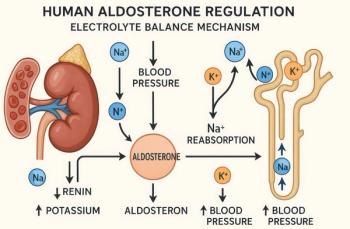
AGS: Centrally Active ACE Inhibitors May Slow Cognitive Decline
SEATTLE -- Lowering blood pressure with centrally active angiotensen enzyme inhibitors may have the added benefit of reducing the risk of cognitive decline, researchers here reported.
SEATTLE, May 7 -- Treating hypertension with centrally active angiotensen enzyme inhibitors may have the added benefit of reducing the risk of cognitive decline, researchers here reported.
Compared with ACE-inhibitors that don't cross the blood-brain barrier, centrally active ACE inhibitors slowed the rate of cognitive decline by 50% (P =0.04), Kaycee Sink, M.D., M.A.S., of Wake Forest reported at the American Geriatrics Society meeting.
The finding emerged from a subset analysis of data collected by the Cardiovascular Health Study, a longitudinal study of risk factors of 5,888 persons older than 65 living in Forsyth County, N.C., Pittsburgh, and Washington Country, Md.
Dr. Sink and colleagues identified 1,074 participants who were free of dementia at baseline and who were being treated for hypertension. The mean age of the patients in the sample was 75 and 64% were women. The researchers analyzed six-years of follow-up data.
Four hundred and fourteen participants were treated with ACE-inhibitors, and 274 of those received centrally active ACE inhibitors.
"The take home message is clear," she said. "If an ACE-inhibitor is indicated, I would recommend using one that crosses the blood-brain barrier."
Those agents are captopril (Capotel), fosinopril (Monopril), lisinopril (Prinivil or Zestril), perindopril (Aceon), ramipril (Altace) and trandolapril (Mavik).
Agents that don't cross the blood brain barrier are benazapril (Lotensin), enalapril (Vasotec), moexepril (Univasc), and quinapril (Accupril).
Cognitive function was assessed using the Modified Mini-Mental State (MMMS) Exam. The results were adjusted for age, race, sex, smoking, income, alcohol, LDL cholesterol, serum creatinine, diabetes, coronary disease, baseline MMMS score, annual systolic blood pressure, and use of other antihypertensive medications.
During six years of follow-up there were 158 incident cases of dementia, which were diagnosed by a panel of physicians using magnetic resonance imaging brain scans as well as test results and clinical examination.
For each year of exposure to a centrally active ACE-inhibitor, the rate of decline in three test domains that measure cognitive function was 50% less for patients using centrally active ACE-inhibitors than for those who used other anti-hypertensive medications, including ACE-inhibitors that did not cross the blood- brain barrier.
There was also a trend toward increased risk of dementia-20% per year-for patients using other agents, but that trend did not reach significance (P =0.07).
Dr. Sink said, however, the study was limited by the inability to adjust for several factors including confounding by indication for centrally active ACE-inhibitor. Confounding by indication is a term used when a variable is a risk factor for a disease among nonexposed persons and is associated with the exposure of interest in the population from which the cases derive, without being an intermediate step in the causal pathway between the exposure and the disease.
Moreover, Dr. Sink added, the study did not assess the impact of dose nor did it assess early versus late exposure to centrally active ACE inhibitors.
Newsletter
Enhance your clinical practice with the Patient Care newsletter, offering the latest evidence-based guidelines, diagnostic insights, and treatment strategies for primary care physicians.


































































































































